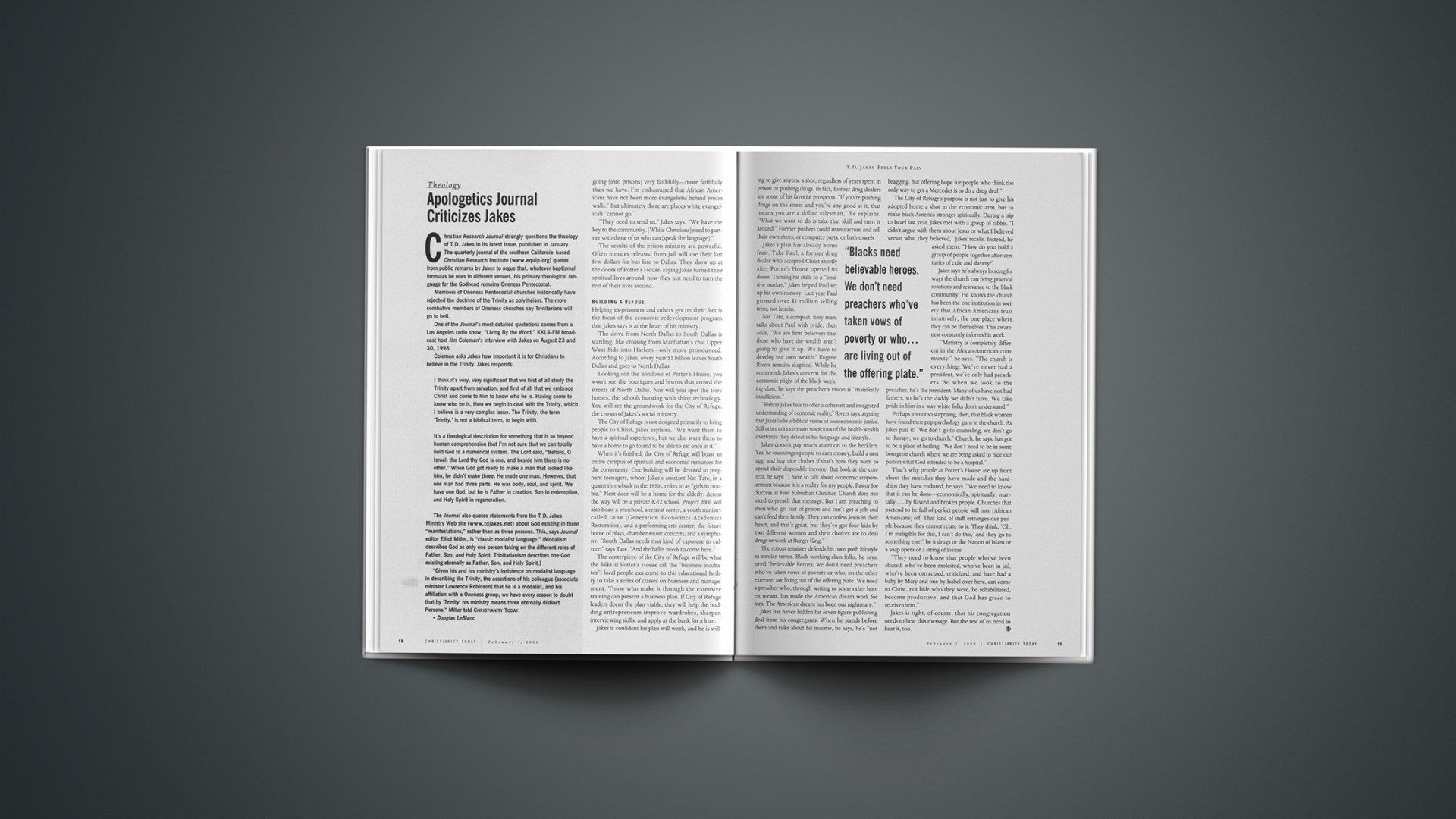Christian Research Journal strongly questions the theology of T.D. Jakes in its latest issue, published in January.
The quarterly journal of the southern California-based Christian Research Institute (www.equip.org) quotes from public remarks by Jakes to argue that, whatever baptismal formulas he uses in different venues, his primary theological language for the Godhead remains Oneness Pentecostal.
Members of Oneness Pentecostal churches historically have rejected the doctrine of the Trinity as polytheism. The more combative members of Oneness churches say Trinitarians will go to hell.
One of the Journal‘s most detailed quotations comes from a Los Angeles radio show, “Living By the Word.” KKLA-FM broadcast host Jim Coleman’s interview with Jakes on August 23 and 30, 1998.
Coleman asks Jakes how important it is for Christians to believe in the Trinity. Jakes responds:
I think it’s very, very significant that we first of all study the Trinity apart from salvation, and first of all that we embrace Christ and come to him to know who he is. Having come to know who he is, then we begin to deal with the Trinity, which I believe is a very complex issue. The Trinity, the term ‘Trinity,’ is not a biblical term, to begin with.
It’s a theological description for something that is so beyond human comprehension that I’m not sure that we can totally hold God to a numerical system. The Lord said, “Behold, O Israel, the Lord thy God is one, and beside him there is no other.” When God got ready to make a man that looked like him, he didn’t make three. He made one man. However, that one man had three parts. He was body, soul, and spirit. We have one God, but he is Father in creation, Son in redemption, and Holy Spirit in regeneration.
The Journal also quotes statements from the T. D. Jakes Ministry Web site (www.tdjakes.net) about God existing in three “manifestations,” rather than as three persons. This, says Journal editor Elliot Miller, is “classic modalist language.” (Modalism describes God as only one person taking on the different roles of Father, Son, and Holy Spirit. Trinitarianism describes one God existing eternally as Father, Son, and Holy Spirit.)”
Given his and his ministry’s insistence on modalist language in describing the Trinity, the assertions of his colleague [associate minister Lawrence Robinson] that he is a modalist, and his affiliation with a Oneness group, we have every reason to doubt that by ‘Trinity’ his ministry means three eternally distinct Persons,” Miller told Christianity Today. Douglas LeBlanc is Associate Editor of Christianity Today.
Related Elsewhere
Jakes responds to the article today on ChrisitanityToday.com.
See last Friday’s article, “T.D. Jakes Feels Your Pain | Though critics question his theology, this fiery preacher packs arenas with a message of emotional healing.”
Our sister publication Christian History took a look at the history of Oneness Pentecostalism in its issue on Pentecostalism. The article, “Dividing Over Oneness | The Oneness movement pushed Pentecostals to organize,” appeared in issue 58 of the magazine.
Christopher Hall’s Christianity Today article “Adding Up the Trinity | What is stimulating the renewed interest in what many consider the most enigmatic Christian doctrine?” appeared in our April 28, 1997 print issue.
Britannica.com has an article on “Attempts to define the Trinity.”
Copyright © 2000 Christianity Today. Click for reprint information.










